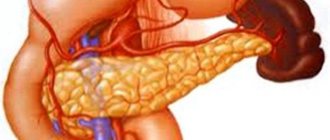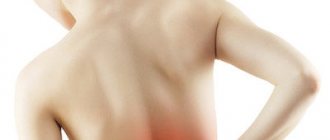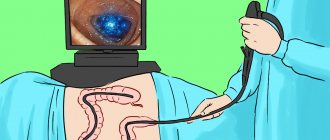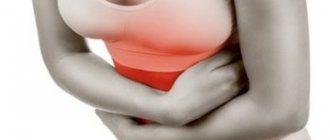Etiology of the disease
The list of factors that provoke the appearance of stomach cough is quite extensive and includes the following diseases:
- adenoviral infection;
- gastritis;
- reproduction of enteroviruses in the gastrointestinal tract;
- parasitic infections;
- peptic ulcer;
- intestinal dysbiosis;
- liver pathologies;
- increased acidity;
- diseases of the rectum.
Cough often occurs due to reflux. This disease is a consequence of dysfunction of the muscle designed to deliver food to the stomach. A secure blockage is released and stomach acid splashes into the esophagus.
This causes damage to the mucous membranes of the respiratory tract, leading to the appearance of a dry cough. Among the factors causing GERD - gastroesophageal reflux disease, the following pathological conditions of the body are noted:
- increased intra-abdominal pressure that occurs with obesity, flatulence, ascites (accumulation of fluid inside the abdominal cavity);
- duodenal ulcer;
- hiatal hernia;
- excessive intragastric pressure, manifested as a result of the consumption of gas-forming types of food products.
Another reason for the development of stomach cough is the entry of a foreign body into the esophagus, and it is also provoked by food poisoning. People over 40 years of age are at risk. The likelihood of stomach cough increases if you are overweight. The question of interest is whether a cough can be a consequence of bad habits. Experts say that a common cause that provokes it is smoking, drinking alcohol, and using drugs.
Characteristic symptoms
The dominant symptom of stomach cough is the absence of sputum. It can be periodic, occurring, for example, after eating or during sleep. Among the characteristic symptoms are heartburn, belching that appears after eating, and nausea. Due to bouts of debilitating dry cough, the patient feels tired and depressed. Symptoms vary depending on the factors that caused the development of stomach cough.
- An indicator of viral infections is frequent vomiting, abdominal pain, and diarrhea.
- Symptoms of reflux are characterized by wheezing and sore throat. Cough and heartburn, bloating appear, and short-term pauses in breathing may occur during sleep.
- Signs of dysbiosis are allergic reactions to various foods, nausea, and imbalance of the digestive system, expressed in constipation or diarrhea. There may be bad breath and bloating.
- If the cough is caused by infection of the intestinal tract with parasites, then symptoms such as increased gas formation, joint pain, insomnia, diarrhea or constipation appear.
- Anemia may develop. Skin problems appear and weight drops sharply.
- Infectious diseases of the stomach and intestinal tract manifest themselves as a long, painful dry cough.
- Enterovirus infection, along with a cough, causes abdominal cramps and general weakness.
- With a stomach ulcer or gastritis, the appearance of a cough is usually associated with food intake and is observed several hours after a meal.
If a person rolls over on his back during sleep, the cough intensifies, provoking a gag reflex. Only a specialist can determine the causes of stomach cough and prescribe treatment, so if you experience characteristic symptoms, you must consult a doctor.
How does the esophagus hurt?
Symptoms vary. Pain in the esophageal canal occurs right at the table or after eating. The patient feels strong pressure, a burning sensation behind the sternum, or a dull, aching pain radiating to the neck, back, and upper limbs.
The pain is often combined with heartburn. It intensifies when a person leans forward, lies horizontally, or during physical activity. The symptom decreases when swallowing saliva or after drinking warm water or antacids.
If the esophagus hurts in the chest? Atypical chest pain associated with the esophagus sometimes appears spontaneously and is not dependent on food intake. Intense, debilitating pain may indicate the presence of ulcerative processes or oncology. Practice shows that atypical pain has various clinical manifestations; patients have difficulty describing their sensations. Often this condition is combined with psychosomatic disorders.
Fibrogastroscopy is considered a safe procedure; side effects after it are extremely rare. However, some patients complain of pain in the esophagus and stomach after the examination.
In general, this is normal, since the tissues are stretched by the gastroscope during manipulation for better examination of the walls. A sore throat may persist for up to 2 days.
If after this period the pain does not go away, becomes more intense, a feverish state develops, it becomes difficult to breathe, vomiting with blood appears, you should contact a medical facility, since injuries to the esophagus with a micro-tear are possible.
If the patient follows all the recommendations of the gastroenterologist, such injuries are excluded. In addition, the esophagus may hurt after FGDS if it has undergone a puncture biopsy.
Diagnostics
Without identifying the relationship between a debilitating cough and the main cause that provokes it, it is impossible to prescribe effective treatment. The initial stage of a gastroenterological examination includes identifying the patient’s complaints and examining him. The palpation method is used, which consists of feeling the abdomen. Tapping - percussion and listening to sounds - auscultation are also performed. If necessary, the following diagnostic measures are prescribed.
- Donation of urine and blood for general analysis. With its help, the presence of an inflammatory process is determined.
- Stool analysis. Allows you to detect intestinal infections and the presence of parasites.
- Fibrogastroscopy. It is prescribed to evaluate the mucous membranes of the digestive organs.
- Endoscopy of the esophagus.
- Intraesophageal pH monitoring. It is carried out throughout the day and allows you to determine the nature, stage of development, and duration of reflux.
- X-ray. This examination is necessary to detect pulmonary pathologies.
- Ultrasound of internal organs.
Infections that cause back pain
Some viral infections localized in the throat, ear and nasopharynx can cause pain felt in the back. Such diseases include:
- tonsillitis;
- laryngitis;
- tracheitis;
- otitis media in advanced form.
In this case, the temperature almost always rises, the throat hurts and feels sore, discomfort is felt in the upper part of the thoracic vertebrae, and it is unpleasant to swallow. This is due to the fact that the developing inflammatory process affects the nerve endings, which transmit pain signals to the back area. Viral infections, especially in childhood, can also cause pain when swallowing, which is clearly felt from the back. There is difficulty eating, and the discomfort is most localized in the upper part of the vertebra. You should definitely visit a therapist who will prescribe antiviral drugs.
Therapeutic drug techniques
Based on the diagnostic results, complex therapy is carried out as prescribed by the attending physician. Its task is to eliminate a specific disease, relieve pain, and bring general well-being back to normal. The drug complex may include the following drugs.
- Prokinetics. Their action is aimed at stimulating gastrointestinal motility. This group of drugs, often prescribed for stomach ulcers, includes Motilak, Motilium.
- Antacids. They help fight high acidity by reducing concentration. Taking medications such as Maalox, Almagel, Alka-Seltzer
eliminates damage to the gastric mucosa caused by hydrochloric acid. They also serve as good preventative agents. - Antisecretory drugs. They inhibit gastric secretion, neutralizing excessively high concentrations of hydrochloric acid. This group of drugs useful for heartburn includes Famotidine, Omeprazole, Ranitidine.
- Antimicrobial drugs. Prescribed for infectious diseases in order to eliminate the development of pathogenic microorganisms.
- Foaming agents. Gaviscon
, a remedy that neutralizes the destructive effects of hydrochloric acid, will help - In case of dysbiosis, it will be necessary to restore the intestinal microflora with the help of prebiotics and probiotics. If a connection between dysbiosis and a fungal infection is identified, then Nystatin, Levorin, Mycoheptin are prescribed.
In order to eliminate discomfort in the throat - soreness, dryness - antitussive medications are prescribed, for example,
Mucaltin.
If treatment is started too late and the development of the disease is detected in the final stages, then surgical intervention may be prescribed for the patient according to indications.
How to treat
If there is a sharp pain when swallowing, which spreads to the esophagus, you need to drink a glass of slightly warmed water. It shouldn't be carbonated. Then you should slowly inhale and exhale.
Important! To eliminate unpleasant symptoms, you can drink a sedative (you can use herbal tea based on lemon balm or mint). After this, you should immediately consult a doctor.
Treatment of pathology largely depends on what causes it. Naturally, you cannot do without medications, but they should not cause any more harm. Treatment may be as follows:
| Causes | Therapy |
| Injuries or hernias | This will require surgical intervention if the situation has gone too far and drug treatment does not work. After surgery, the patient will need to undergo a recovery period. |
| Burn | It is necessary to neutralize the effect of the substance that causes injury to the organ. Next, the patient will need diet and drug therapy. In rare cases, surgery is required. |
| Pregnancy | The main treatment will be a diet that involves eating very small portions. After childbirth, the stomach pain will disappear. |
| Esophagitis | In this case, a strict diet and drug treatment are necessary until the end of the acute period. |
| Tumor | Radiation or chemical therapy, as well as surgery, will be required. |
Treatment with medications is necessary in almost all cases. The patient may be prescribed the following medications:
- Antispasmodics: No-shpa, Atropine.
- Sedatives: Novo-passit.
- Painkillers: Nifidipine.
- Local anesthetics (for severe pain that can radiate to other parts of the body): Novocaine.
- Special enveloping agents that protect the mucous membrane: Almagel.
- Antacids (if reflux is present). If the esophagus hurts when swallowing and more.
Physiotherapy is no less useful. Electrophoresis will be useful. It helps relieve pain when swallowing food. It is important to pay attention to your diet. Perhaps its revision will eliminate many problems. It is better to give up heavy and junk food, alcohol, and processed foods. You should diversify your diet with plant foods and juices. It is worth consulting with a gastroenterologist and nutritionist.
Folk remedies
When eliminating a specific cough from the stomach, you can turn to the experience of healers who use a variety of medicinal herbs. But treatment with folk remedies will be beneficial if you have previously received permission from a doctor to include them in the main therapeutic complex.
- Relieves cough due to gastritis of the stomach by taking a teaspoon of olive oil (250 ml) mixed with honey (100 g) the day before meals. Store the product in a glass container under a lid in the refrigerator.
- You can use mumiyo for stomach cough. Take a small piece on the tip of a knife, dissolve it in half a glass of warm milk and drink it before breakfast and dinner.
- If the cough is accompanied by digestive disorders arising from high acidity, then in the morning on an empty stomach drink half a glass of fresh potato juice.
- Herbal decoctions speed up relief from stomach cough. You can use chamomile, licorice, sage, plantain. In the morning, boil a tablespoon of raw material in a glass of water for 10 minutes. Cool, filter and drink three times a third of a glass before meals.
- Flaxseed has a beneficial effect on the stomach, restoring damaged mucous membranes. Pour a tablespoon of seeds into 300 ml of warm water in the evening. In the morning, strain and drink 100 ml 30 minutes before breakfast, lunch and dinner for a week.
Contraindications to folk remedies for gastrointestinal pathologies include pregnancy, breastfeeding, allergies, age under two years, and the presence of cancer.
Prevention
One of the areas of preventive methods is maintaining a special diet that includes several rules. The practice is to switch to five split meals a day, which involves eating in small portions. In order for the stomach to function normally, excessively fatty, spicy foods, and alcohol are excluded from the diet. Daily inclusion of vegetables, fresh herbs, and fruits in the menu will be beneficial. Daily walks and physical activity are recommended. You should also adhere to the norms of a healthy lifestyle during the treatment process if you cough heavily due to gastrointestinal problems. Possession of information about the symptoms and treatment characteristic of stomach cough should serve as a motive for timely seeking medical help.










